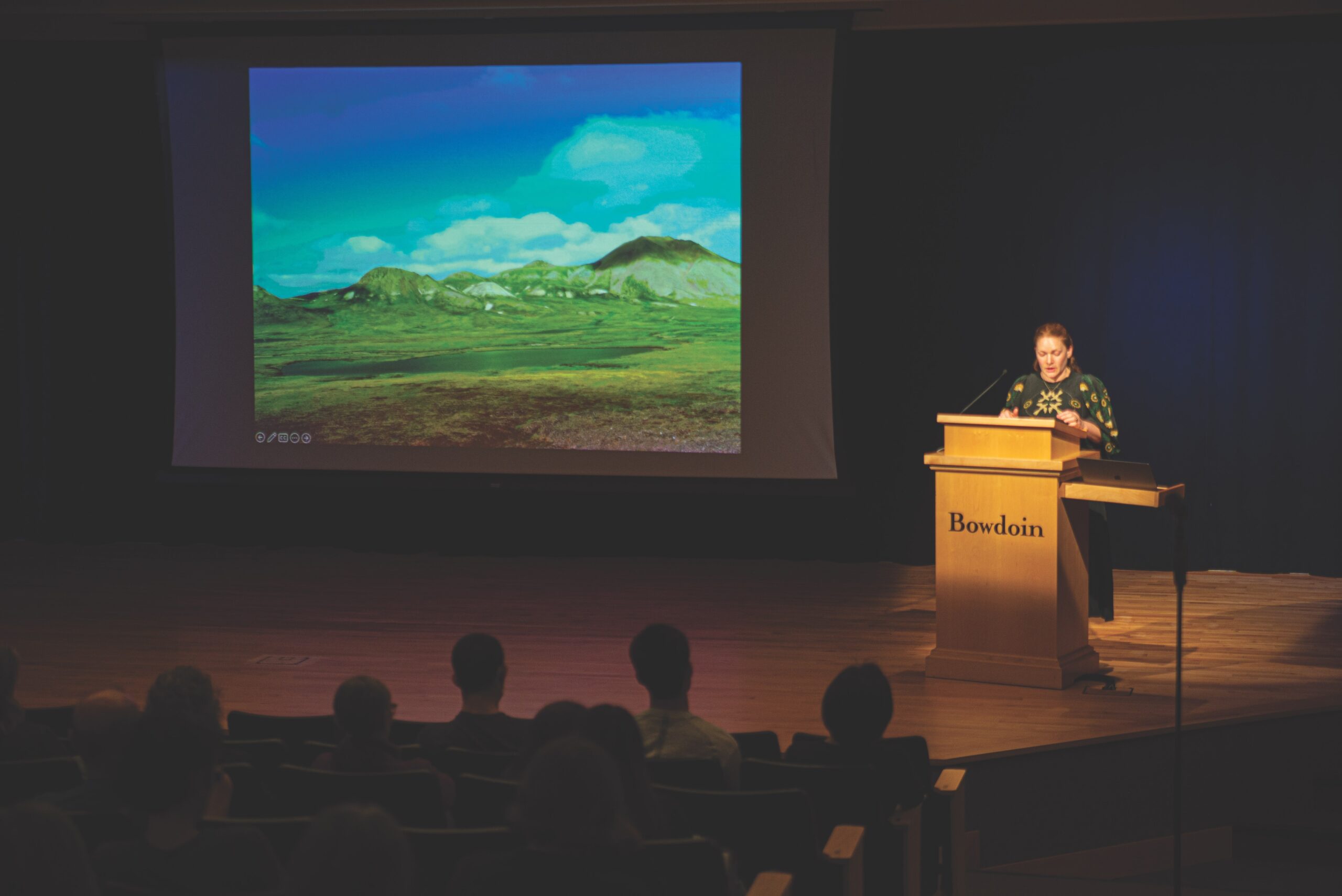Demuth shares lessons from Chukotka on enduring environmental change
October 13, 2023
 Cora Dow
Cora DowLast Tuesday, the College hosted associate professor of history and environment and society at Brown University Bathsheba Demuth to give a talk entitled “The Reindeer at the End of the World: Apocalypse, Climate and Soviet Dreams.” The lecture, sponsored by the Environmental Studies Program, expanded on themes from Demuth’s debut book “Floating Coast: An Environmental History of the Bering Strait.”
Professor of History and Environmental Studies Connie Chiang organized the event in conjunction with her advanced environmental science seminar. Chiang first taught both the class and Demuth’s book in Fall 2021. This semester, Chiang wanted to supplement the course with a public lecture to urge discussion on the community impacts of climate change.
“My students and I were so inspired by [Demuth’s] work that I decided that I wanted to invite her to come to campus when I taught my seminar again,” Chiang wrote in an email to the Orient. “Demuth is a beautiful writer and storyteller and has a gift for making the past and its people and animals really come alive for the reader.”
As in her book, throughout her talk, Demuth painted a picture of life in Chukotka, the eastern Russian peninsula of the Bering strait. She focused on how the rise and fall of the Soviet Union impacted the Chukchi people and how their environment is intertwined with the lives of reindeer and tundra.
“To live [in the Chukotka Peninsula] required supplication and a frank acknowledgement of dependance on beings other than humans. Chukchi social life was, and in many ways still is, made up of persons not all of whom were human, but many were reindeer,” Demuth said. “Chukchi observations about the operation of time in the Arctic are resonant with contemporary scientific work on northern climate and species, which look at the way … the Arctic has seen cyclical changes in the ways in which the climate operates.”
Demuth posited that, while the Chukchi viewed life as the symbiosis between man and nature, the Soviet Union saw the world as one in which the environment was simply a resource to supplement humans. At the height of Soviet power, Chukotka became a more mechanized, less connected society, built linearly and, in Soviet eyes, continually towards the path of greatness.
By tracing the life of Karl Yanovich Luks, a prominent member of Vladmir Lenin’s army, Demuth described the challenges that arose when the Soviet government began imposing their vision of society on Chukotka as part of a Communist vision of progress.
“Karl did not ask the Chukchi if they wanted this new world—no one did. Nor did anyone ask the foxes if they wanted to be in pens, or the reindeer about the corrals. To do so was not thinkable,” Demuth said.
Demuth discussed the widespread perspective of climate change as apocalyptic in the context of the revolutionary shifts that the Chukchi people faced throughout the colonization of Chukotka and the later destruction of the Soviet Union. Demuth concluded that often in viewing these issues as an apocalyptic prophecy, the day-to-day realities often become lost. The perseverance of the Chukchi in their continuation of everyday life brings a lesson of hope in the face of hardship.
“‘No one knew what would happen [after Soviet collapse]’—Alex [a native Chukchi guide] told me—‘We couldn’t just hope that it would end’,” Demuth said. “‘The trick to surviving was in knowing something about the land and the animals and to keep going on without any certainty.’”
Lauren Bains ’27 particularly appreciated the talk’s emphasis on hope and perseverance, especially in understanding the climate crisis today.
“I think [this talk] speaks on hope because, right now, there’s a lot of fear going on about climate change, but this shows off the resilience of people,” Bains said.
For Brunswick community member Kurt Greenstone, the talk spoke to the power of resilience and of leaning on each other to create greater change.
“I think a lot of history is a bunch of little permanent things. Nothing is permanent, and my life would be no exception to that. I think that we all can live in a way that we would like to see as progress, and I think that my impact would be as an example for others, like my family, like my kids. We all have an opportunity to lead by example,” Greenstone said.
At the end of the lecture, Demuth urged the audience to look to their own everyday lives and the people within them to make small, human impacts, rather than striving for grandiosity.
“[Chukotka’s history] asks that we, particularly those of us so privileged to be imagining the end of the world for the first time, trade the temptation of apocalyptic escapism for a kind of world historical humility,” Demuth said. “Chukotka is a lesson in how restoring what has broken is a reminder to be careful with what is here and now. It is an entreaty to make things last, to create better ruins and to care for what will outlast our small and tender lives.”

Comments
Before submitting a comment, please review our comment policy. Some key points from the policy: